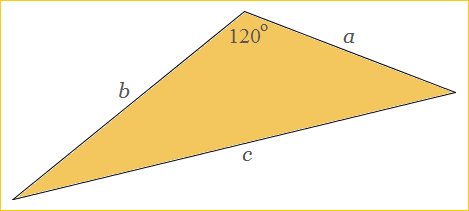Integer Triangles with a 120° Angle
Just as there are integer right triangles, so there are integer 120° triangles. In such triangles, all side lengths are whole numbers and the obtuse angle measures exactly 120°.
If the two sides adjacent to the 120° angle are a and b and the third side is c, then a, b, and c satisfy a Pythagorean-like relation:
a² + ab + b² = c²,
which holds for all 120° triangles, not just the integer ones.

To find triples (a, b, c) that satisfy the relation a² + ab + b² = c², you can use generator functions similar to the generator functions for Pythagorean triples. In the 120° case, the equations are
a = m² - n²
b = 2mn + n²
c = m² + mn + n²,
where m and n are integers and m > n. Observe:
(m² - n²)² + (m² - n²)(2mn + n²) + (2mn + n²)² = (m² + mn + n²)².
In this way you can come up with infinitely many triples (a, b, c). The first few primitive triples (those in which a, b, and c have no factors in common) are given in the table below:
| a | b | c |
| 3 | 5 | 7 |
| 7 | 8 | 13 |
| 5 | 16 | 19 |
| 11 | 24 | 31 |
| 7 | 33 | 37 |
| 13 | 35 | 43 |
| 16 | 39 | 49 |
| 9 | 56 | 61 |
| 32 | 45 | 67 |
| 17 | 63 | 73 |
| 40 | 51 | 79 |
| 11 | 85 | 91 |
| 19 | 80 | 91 |
| 55 | 57 | 97 |
The first few triples with consecutive integer side lengths are
(7, 8, 13)
(104, 105, 181)
(1455, 1456, 2521)
(20272, 20273, 35113).
© Had2Know 2010
